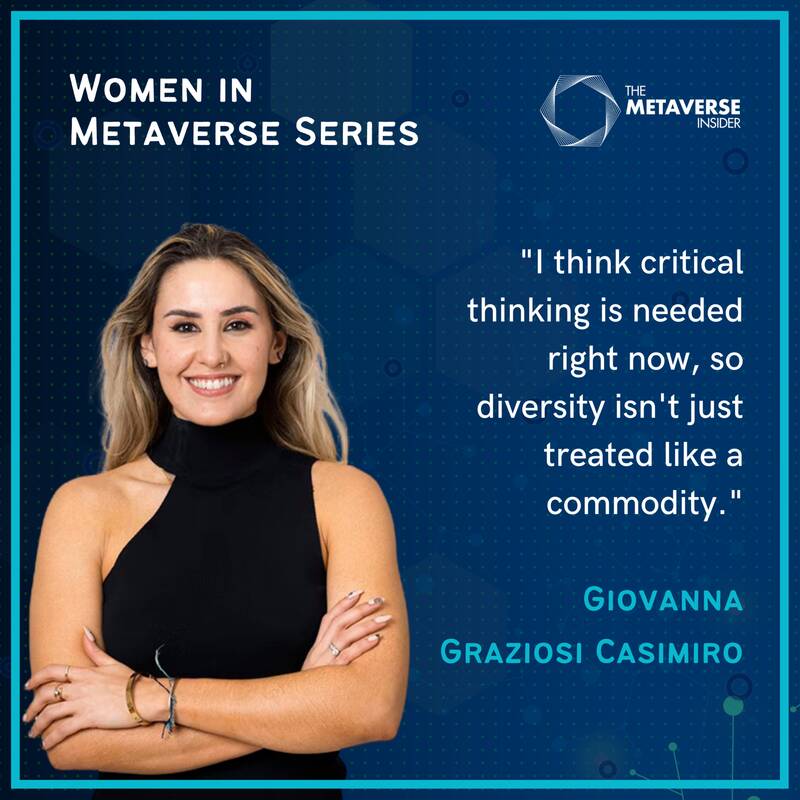Of the many companies building the metaverse, one of the most well-known is Decentraland. As a platform where users can build, buy, or sell virtual land, and have fun experiences within the space, the company has become extremely popular. One of the individuals leveraging this popularity for branding and events is Dr. Giovanna Graziosi Casimiro, the Metaverse Producer at the Decentraland Foundation. Unlike Decentraland the company, the Decentraland Foundation was created by the Decentraland DAO as a non-profit. This gives Graziosi Casimiro more creativity in event planning for Decentraland users. “My mission is to lead the creation of events, and help put those events on,” she explained. “So, it’s a mix of project management and events management, but also connecting brands with the creative community we have on the platform.”
It was this creative community that originally drew Graziosi Casimiro into the industry. “I started as a visual artist, that was my bachelor’s degree,” said Graziosi Casimiro. “So, I started more in the hands-on traditional visual arts, like pottery or even graphic pattern design. But in that process, I very quickly started turning my attention to the digital art movement. I began an academic research project looking at artists in South America that were working with language and video installation.” From her research, Graziosi Casimiro’s interests quickly shifted. “After that, my master’s degree focused on XR technology applied to art museums and art galleries. Then, I did a Ph.D. on open-source collections for heritages.” While she studied, Graziosi Cassimiro. also worked, inspired by other creative talents using the space to showcase their work.
With her work bringing metaverse technology and art together, Graziosi Casimiro found that artists were beginning to be treated differently due to the advancement of this technology. “I remember being an artist in the 2010s,” she stated, “and people would always say: ‘Okay, so that’s your field of study, but what is your profession, or how are you going to make money?’ But today, you being a creative is now a viable profession. It’s about the creatives in the industry, the creative revolution. Those are the people who are proving that the industry is changing.” As an artist herself, Graziosi Casimiro saw the metaverse as a way for artists to have more authority over their work. “I think artists are finally having more control over their revenue and their voice, which is beautiful to see,” she added.

As an executive working on building events within the metaverse, Graziosi Casimiro is also interested in ways to draw more people into this space, particularly underrepresented groups. According to Graziosi Casimiro: “I still feel that sometimes there are core projects or properties within Decentraland Metaverse, like land owners, that are mostly male. So, I think those are the places where we have to maybe facilitate things for women or for the LGBTQ community.” Already, Graziosi Casimiro has seen this process beginning to happen. “I do see a lot of women taking charge in the Web3 space,” she said. “I am connected with a lot of amazing communities led by females. I think we’re also seeing this discussion around diversity coming to the surface because the metaverse becomes this tool of self-expression. So, the diversity is coming, we’re just not there yet.”
If you are interested to learn more, check our article about Decentraland Metaverse
In transitioning to a more diverse metaverse, Graziosi Casimiro hopes companies and individuals will be truly transparent in this process. She mentioned a recent meeting where someone claimed the meeting was led by a female, but she found that a man did most of the talking. This made her frustrated enough to post on Twitter about it. “Clearly not every project that is ‘led by females’ is really benefitting females,” Graziosi Casimiro explained. “So, I think critical thinking is needed right now, so diversity isn’t just treated like a commodity.” Graziosi Casimiro believes that one way to avoid this issue is to get more brands involved financially. According to her: “It would be nice to see more brands that are trying to enter the metaverse have a strategy of creating grants or funds to benefit the minorities within this space. I think that’s a doable action point.”
If you found this article to be informative, you can explore more current Digital Twin news here exclusives, interviews, and podcasts.













